Once I started reading Una McCormack’s upcoming book The Autobiography of Kathryn Janeway, I didn’t want to stop. When I got on the phone with Una McCormack for this interview, I didn’t want to end that either: She’s enthusiastic, warm, thoughtful, perceptive, laughs a lot, and is “always happy to waffle on about Star Trek,” as she said when I thanked her for her time.
Most of McCormack’s Star Trek books—she also writes Doctor Who novels—are focused on her favorite Trek show, Deep Space Nine, although she took on new territory last year with the Discovery novel The Way to the Stars, and this year with the Picard novel The Last Best Hope. And her new exploration of Kathryn Janeway’s life before, during, and after her time on the starship Voyager is a must-read for any Voyager fan.
Below, a condensed version of our talk.
So what is your personal history with Voyager as a show?
I’m sure it’s no surprise to those who know my books that my show is Deep Space Nine. I’m absolutely mad about it. But I hadn’t watched a lot of Voyager. It was always tricky to get see things in the UK. So Voyager I kind of dipped in and out of. I distinctly remember, for some reason, I was in America for the finale. A little gang of us gathered and watched the Voyager finale, which is pretty mind-blowing. That’s the kind of thing to do with the gang of mates.
But there was a lot I haven’t seen in some time. And I MASSIVELY enjoyed it. (laughs) It was interesting to watch it as a show that is transitioning away from that studio-bound Trek of The Original Series and early Next Gen into something that you can see is just before things like Battlestar Galactica are starting to happen. By the end it looks absolutely stunning.
So I was not as addicted as I was to Deep Space Nine, which is a show that just hits you in all the right spots. But to come back to it again, was really enjoyable, actually. I think I got through the lot in about seven weeks. It was quite immersive.
What was your starting point for such a huge writing task?
I took a look at the other books of that kind they’d done in the series [The Autobiography of Jean-Luc Picard and The Autobiography of James T. Kirk], and had a sense of the kind of shape that they want. And we didn’t want the whole book to just be taken up with Voyager—we wanted this to be a narrative of her whole life. There’s actually quite a lot in the show about Kathryn’s childhood, lots of throwaway lines. That’s a bit of a gift. And then, my background… I started out as a fan fiction writer, so pretty skilled at taking 2025 small facts and weaving them into a coherent narrative. So it was absolutely up my alley.
What I always try and do when I’m writing is have a book or something that my own story’s in conversation with. So I kept on coming back to The Wizard of Oz, and Dorothy, and trying to keep that as sort of Earth story in my mind. There’s no place like home, there’s no place like home… trying to weave a sense of that through it. But also I really wanted to see the making of a successful woman. When she was cast, it was “Good heavens, a woman in the captain’s chair!” I know that it’s not an issue, as far as Starfleet’s concerned or that future is concerned, but maybe interrogate some of that in the book, what it means to be a woman in command, or to have a career. One of the things I go into in this book is that by virtue of being thrown across space, she has been forced into this choice between career and home. It’s not her society that’s doing it, it’s the course of her adventure, so to explore those themes in the book in a way that you perhaps couldn’t otherwise in a Star Trek book.
Those were the sort of things I wanted to touch on. And then it’s just such a gift: Kate Mulgrew… such an amazing performance. I’ve seen her once at a convention; it was like Hollywood swept in, she’s just amazing. So I had that voice in my ear, I really felt like I was in conversation and interviewing someone to get their autobiography. It was just so much fun.
Have you read Kate Mulgrew’s two memoirs?
I’ve read Born With Teeth. But I haven’t read the memoir of her mother. [How to Forget] But I love reading them. Andy Robinson has a great memoir of his acting career as well. I really enjoy reading memoirs, because I’m a bit nosy.
Did you feel at all influenced by her memoir?
I think mostly it was to hear that voice. I mean, obviously, they’re [Mulgrew and Janeway] different people. But Janeway’s voice is so strong and is so closely connected to that voice, that I wanted to hear somebody telling a life story in that voice. But yeah, I’m very clear my mind that these are two very different people. (laughs)
I don’t think it would have made a difference to the book if I hadn’t read it. But I think particularly because it’s in first person to be able to spend more time with that voice or something close to that voice, then you feel perhaps you get a bit more immersed in it.
In terms of deciding which events and episodes to include in the Voyager parts, what spoke to you first and loudest that you knew you had to include?
The stories that I really wanted to tell were about mentorship. Watching it back, a lot of Voyager struck me about being people who are in loco parentis, and who are nurturing or mentoring other people. Particularly with Janeway, there’s a lot of that with her, obviously with Seven. But at the same time with people like B’Elanna or Naomi Wildman, who… I give her a little preface at the start [of the book]. They’ve all been torn away from family. And they think they might not get back in their lifetime, some of them. So those were the things I added to the key emotional stories I wanted to tell.
Tom Paris as well, to some extent. That’s something I play up with Janeway’s relationship with his father. We knew when we were working on the outline we had to address Tuvix. We sat and went, these are ones that we really do need to touch on. We obviously don’t want to go through every episode. You’re trying to weave a coherent retelling from them. The one that I particularly enjoyed was where they meet the Starfleet ship.
The Equinox?
That was just an absolutely stunning two-parter. That was one I particularly wanted to cover. And then “Pathfinder”… so they were very enjoyable to tell. And I’ve got a very soft spot for Barclay. I think my first Trek fan fiction was about him, so I really wanted to get him in there. And I just ended up with real soft spots for characters I didn’t expect. I never thought I’d have a soft spot for Neelix but I was genuinely crying at his farewell, honestly sentimental—I’m such a soft touch. And Tuvok’s little foot/soft shoe shuffle… just absolutely beautifully done, that. I love that kind of thing in Trek, that paying off the story after years. There were emotional stories that I really wanted to tell. And there were dramatic beats we knew we had to hit.
I was surprised and thrilled that you included “Workforce.” I always think of it as an important one for Janeway.
Yes, indeed. She sees this glimpse of a life. It’s really interesting, Voyager, how it offers different versions of how these people could be living their lives again and again and again. You know, they find themselves in parallel universes or worlds where they might lead different lives. So that was something that I wanted to touch on as well.
Were there any episodes that had a big impact on you that you didn’t include?
There’s one that we had to pass over, isn’t there? The one with the… is it “Threshold”?
Lizard babies?
Yeah. We kind of went, “Oh, God.” (laughing) We kind of bounced that one around… we pleaded the fifth on that one: “Come on, guys. We’re doing our best here with difficult materials.” (laughs) I worked quite closely with Dayton Ward, and he said, “Just make it classified.” (laughs)
I saw he’s mentioned in the acknowledgments for that.
Absolutely brilliant. Plead the fifth.
Were you given any parameters about what you could and couldn’t explore?
Not really. I’ve been writing fan fiction for a while now, so you negotiate with the license holder: Should we do this, should we do that?
I know that there have been two novels about Janeway, sort of biographical novels by Jeri Taylor, which came out during the run of the show. And we went, ‘Should we feel beholden to these?’ And ultimately, if we’re beholden to someone else’s novels, there’s not really a novel here.
And hopefully this book will stand on its own, but honor what was in those books, too. For example, I adopted the names that she gave to her mother and sister, but found my way ‘round reimagined relationships and other biographical details.
In terms of Tom Paris, I love that in the book, Janeway knew him from the time he was a child, and followed the thread of his life. What about that character interested you so much? (Warning: spoilers in this answer.)
I felt really sorry for him. I think rewatching it, he’s easy to dislike: You’ve got a flyboy who’s wrecked his opportunities. It would be easy to write him that way. But by the time you get to the end of the story, he and B’Elanna have sorted it out. And they’ve managed to get away from family situations, and have been forced to show what they can be as grownups. I just got quite fond of him in a way. And I thought he spent all his life trying to fit into Starfleet when really, he’s probably happier as a househusband. (laughs) And you’ve got this admiral in the family and how difficult that must be. I suppose I wanted to detoxify his masculinity in a way and give him another way of living. And I think he’d enjoy nurturing B’Elanna’s Starfleet career, I think she’d be phenomenal at it. An interesting spin on that is for him to go, “At the end of the day. I’m just glad not to be on a spaceship anymore.” (laughs) That’s quite a good ending for that sort of jock flyboy character. So I’ve got quite fond of Tom, you can probably tell that.
I had a big switch on him too, because his character wasn’t super likable in the beginning. Robert Duncan McNeill and Garrett Wang have a podcast, and listening to Robbie talk about it has changed the way that I view the character. So that, along with your book, really turned the way that I feel about him around.
Good. That’s what Tom needed. He needed people to stop seeing him as the person he was, and see the potential person he could be. And we all need a bit of that in our life every so often.
It was so gratifying as a reader to read certain scenes, because the show ends and they’re home, and we never actually see even the rest of that day. The way that you captured it was surprisingly emotional, I was very affected by it. What were those scenes like to write?
Oh, they were absolutely lovely. Again, I think this is my fan fiction background. In that, I guess the first time I did this, when you watch the last episode of Deep Space Nine, you kind of go, “Well you can’t leave me there. Come on, I want to sit down with Garak for at least, you know, eight years, for goodness sakes.” That’s your impulse. And of course, they don’t have time to do that in an 87-minute season finale. But you do in a book, you get to go through that day, the dislocation and the bizarreness, and seeing the family again: Ensign Harry Kim, there’s your parents.
There was a British TV show back in the ‘80s, called Tenko. It’s set in a women’s prisoner of war camp on the Japanese front. And they get liberated right at the start of the final season, and then the whole of that season is about them dealing with becoming free. Which I think is great, because that’s exactly the kind of story beats I wanted to go through; the conflict, not the consequences, but the aftermath of the experience. So they were some of the nicest bits to write, they wrote very organically. I think I’d been with the characters a while then. And you have a lot of fun coming up with your own narrative to these people. I hope people enjoy it.
I’ve been waiting years for that.
I’m glad it delivers. Good!
The other big emotional moment for me was when Janeway speaks to her mother for the first time when she’s still on Voyager. I actually cried a little when I read that part. It just got to me in a very personal way.
I suppose people reading it now, I suppose it’s got this extra poignancy of being in lockdown and not seeing people and only seeing them on Zoom. So I’m glad it’s delivering the emotional goods.
Seven and Icheb both turn up in Picard, but that’s not accounted for in the book. Did you know that that was happening when you were writing it?
I must have known because I wrote this book after I wrote Last Best Hope, which is my Star Trek: Picard novel. So I think we were clear that that that stuff was all happening in the future. And I’m fairly certain the Janeway book doesn’t contradict, but of course, they’ve now announced the new show. So… (laughs)
And we don’t even know the time period in Janeway’s life that Prodigy is taking place in, right?
Yeah, you can’t get yourself into knots about it. I think so. It’s a shame the book couldn’t come out over this summer. But nobody expected a global pandemic, I suppose.
In The Original Series, there were a lot of science fiction writers who ended up writing episodes. And then you had Kirsten Beyer who started out writing novels and co-created Star Trek: Picard. Obviously, Michael Chabon is one of the big novelists who found their way into writing for onscreen Trek. Is that something you would want to do too?
Well, it would be fantastic. I think it’s quite hard to work in Hollywood if you’re not near Hollywood. And I’m a very long way from Hollywood. Theoretically, that would be amazing. I have written audio dramas, and I have done a little bit of scripting, but I’ve never written a screenplay. And I do tend to think of myself as a novelist. But if somebody kind of rang me up and said, “Oh, do you want to write Star Trek?” I’m not going to say no. (laughs) Instantly, this minute. Ideally, I’d have a Star Trek: Cardassia. And that would be my show.
You said you started doing fan fiction, so what would your advice be to the other fan fiction writers out there? What would you tell them in terms of turning what they’re doing into more of a professional path?
I think what’s really tricky about this is that the advice that I had to give them isn’t borne out by what happened to me.
I was commissioned because I was recommended because of my fan fiction. The important thing you have to understand about this is that it never happens. The advice that I would give is that you should be writing and trying to get published, with your own stuff, in as many genres—by which I mean, style—so novel, short story, audio, play, screenplay, as many as you can. Because there are not many tie-in commissions in a year. Think about how many Star Trek novels there are published in a year, think how many science fiction novels are published in a year. And I think now because they’re doing so few, particularly when a show is on air, they tend to commission with a little less risk. So they will commission from an author that they’ve worked with, because you’re tied into production schedules. So when a show is off air, and this happened with Doctor Who, and it happens with the Star Trek books as well, you have a little bit more freedom, you can commission new writers. So Doctor Who, when it was off air, after the old show, commissioned a whole load of people at the start of their careers do these really quite experimental science fiction novels. And these are people who became their names are very familiar. They’re things like Russell T. Davies, Paul Cornell. They’re people who go on to write for the show.
So if you’re serious about getting a Star Trek novel, at the moment, what you need to be doing is writing your own stuff and getting published and getting your name recognized.
And keep an eye out. I’m not sure Strange New Worlds, the competition, runs anymore. But if you’re a Doctor Who fan, for example, keep an eye on a company called Big Finish, who produce licensed spin-off audio dramas, and they regularly hold competitions for new writers. So there’s opportunities there. But it’s quite a tough gig to break into.
Keep writing, keep publishing, have faith in your own stuff. And who knows? One day, you might get a gig.
So we’ve learned that Number One’s name is Una. How do you feel about that?
Oh, my God. I couldn’t believe it. I couldn’t. ‘Cause I saw and couldn’t bloody believe it.
How did you find out about that?
Gosh, I think somebody tweeted me. I think it was in one of the Short Treks first. I think it might have been Dave Mack, tweeting about it because somebody had asked him and it and it came out of the books originally. They’d given her that name, partly because of me and partly because obviously Una and One. And then got canonized and, and somebody had tweeted him… and they’d got the subtitle slightly wrong, so it looked like it was “Nuna” for a bit. But somebody tweeted him and he said, “Yes, I can confirm that. This is a name that we gave partly in honor of our colleague Una McCormack,” and I’m like, “Oh my god, I’m only Number bloody One.” They’ve just torpedoed me in at the start of Star Trek, and there I am through the DNA. It was a wonderful, really, really lovely feeling. It’s just one of those things that I didn’t know I wanted that to happen to me. And now it has. It’s one of the nicest things that’s happened to me.
The Autobiography of Kathryn Janeway by Una McCormack arrived on October 27. You can order it at Amazon.
DISCLAIMER: We may link to products to buy on Amazon in our articles, these links are customized affiliate links that support TrekMovie by earning a small commission when you purchase through the links.
Check out more exclusive interviews at TrekMovie.com.

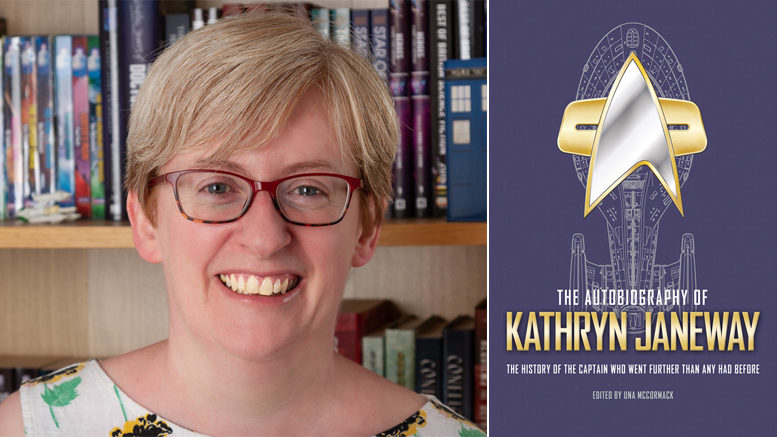
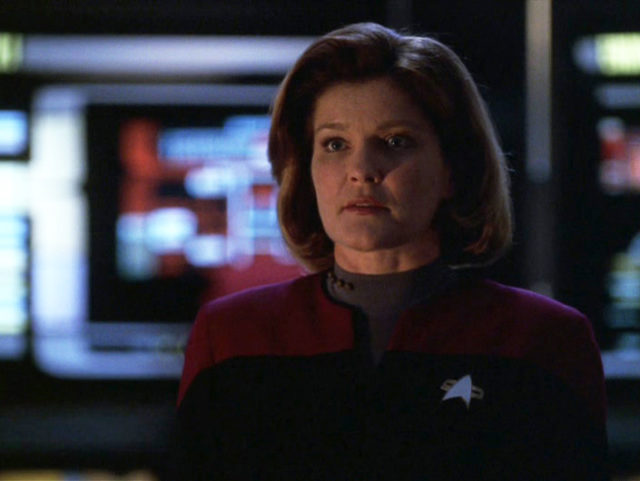
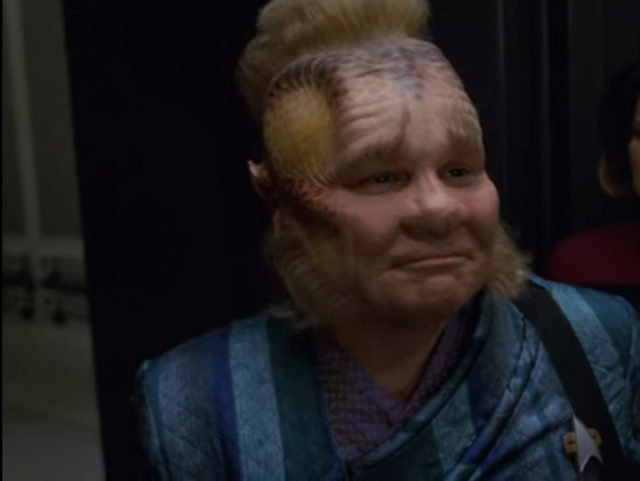
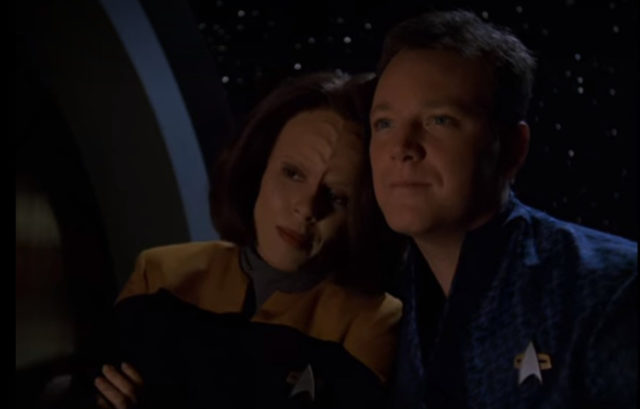
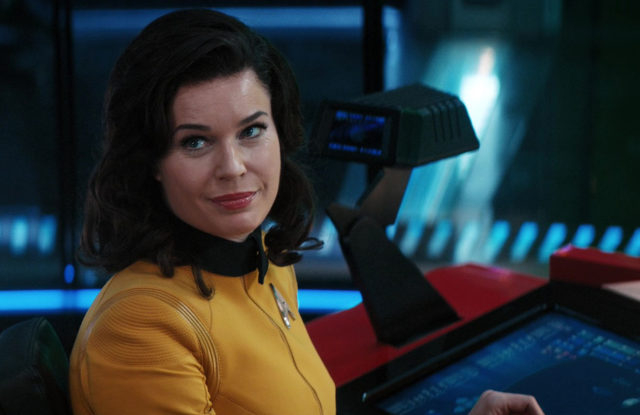
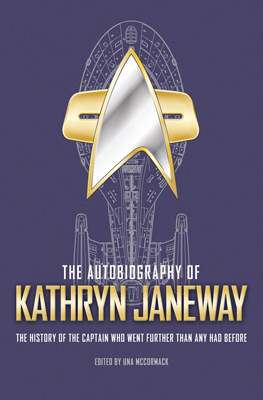
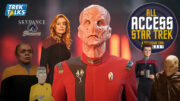
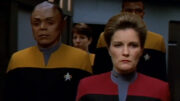
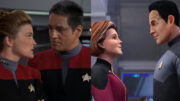
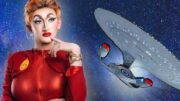
Una McCormack is a lifelong appreciator of the book THE LORD OF THE RINGS. She was interviewed on TheTolkienExperiencePodcast this past May.
Love, love, love Janeway!
This book sounds amazing and just part of a big ressurangance year for the character in general. This weekend, her monument statue is finally being revealed in Bloomington, Indiana tomorrow. And I read Mulgrew herself will be there to reveal it! And it’s still amazing to know Janeway herself will be part of the franchise again in Prodigy a year from now! So an entire new generation of fans will be introduced to her while all the old fans can revisit the character after 20 years.
It’s a great time to be a Star Trek fan again! So much is going on these days.
Agreed, Tiger. Love seeing the resurrection of these beloved characters. I’ve only read about a dozen Trek books over the years, but this may be the next one.
Love love love Una’s work, so I’m quite looking forward to this book. Now would they please commission her to write a Doctor Who/Star Trek crossover ep for series 4 of Discovery? That would be epic!
Do you think they could crossover without being silly? I love them both btw, but such different universes.
Yes I think it could be done quite well with the right writer. Doesn’t have to be serious, indeed – could be an earth shattering episode.
I think those types of crossovers are best left for the comic books.
All due respect, but that’s a terrible idea. Crossing over these two franchises would be very problematic, very complicated, and very difficult. And I doubt anyone running either of them at present could do it to anyone’s liking.
I respectfully disagree. A crossover doesn’t have to be problematic, complicated or difficult to do. It doesn’t have to be an out and out crossover, it could be an encounter with a character, or situation that could be common to both franchises. Lets think outside of the negative or the obvious and imagine what amazing things could be…
Una, your books are amazing! Write one about The Sisko!!
Great suggestion!
I agree!! While I will be reading this Janeway book, I find Sisko so much more interesting. While not my favorite captain, Sisko definitely had the most interesting life compared to all the other captains.
Now that I think about it, Una should write a book like this for all the captains!
Star Trek: Cardassia!
Come-on Alex Kurtzman, give us a made-for-streaming movie…
You’ve got an author who could give you something great.
I’ll be honest, Una McCormack’s Cardassian novels were amongst the last of the Relaunch threads that I got too. I just couldn’t see myself enjoying a dive into that dark and wounded culture.
But her books in some of the “event” miniseries, particularly in “The Fall” sequence, we’re unavoidable. After seeing what she did with those, I was hooked.
Just dropping a line to Laurie to thank her for doing author interviews.
More would be welcome. :)